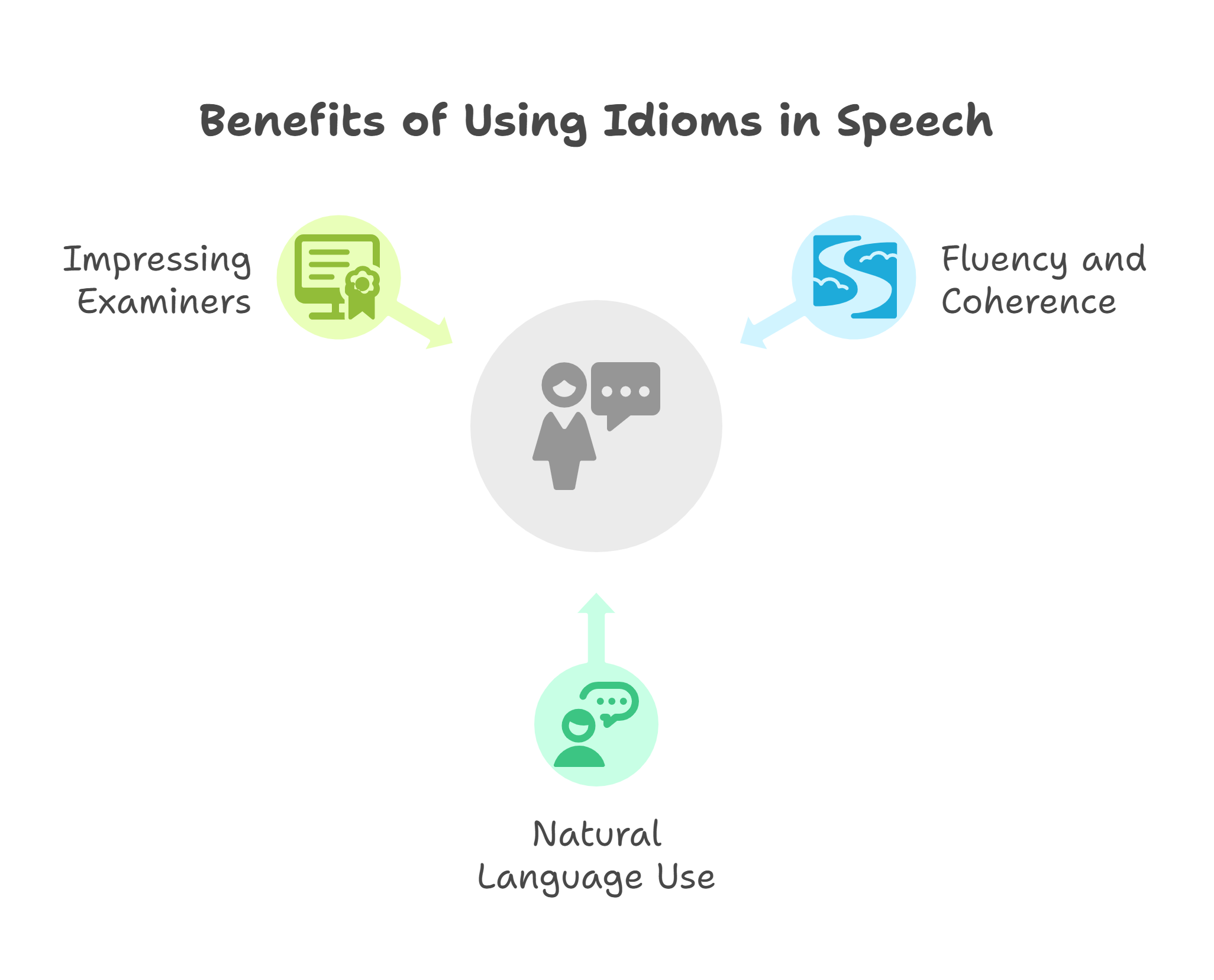Table of Contents
Idioms About Success and Failure for IELTS Speaking are very useful. They help you sound more fluent and confident. Idioms can express feelings in a natural way. Native speakers use them all the time. You can use them in daily conversations too. IELTS examiners love to hear natural expressions. It shows you know real-world English. But you must use them correctly and wisely.
Many idioms talk about winning and losing. These are perfect for speaking test questions. You can talk about your goals or failures. Idioms help you explain those better. They add emotion and color to your speech. So learn a few and use them well. This guide will help you master them fast.
Master the IELTS Exam with Online Coaching – Enroll Today!
Idioms About Success and Failure for IELTS Speaking: Introduction
Using idioms in IELTS Speaking shows strong language skills. It helps you sound more fluent and natural. Examiners notice when your speech feels real. This makes a good impression in the test. Idioms add life to your answers. They help explain ideas with emotion and clarity. That’s why idioms are great for IELTS Speaking.
Idioms also boost your vocabulary score easily. They show you understand real English phrases. This can help you reach Band 7 or more. But use idioms in the right way. Don’t overuse or force them in answers. Practice makes idioms feel natural and smooth. Start with a few easy ones first.
One useful topic is success and failure idioms. These help you talk about wins or losses. You can use them in many speaking questions. They fit stories, goals, results, and challenges. In this blog, we’ll learn 25+ useful idioms. All come with meanings and clear examples. Let’s begin your journey to sound more native!
Why Use Idioms in IELTS Speaking?
1: Most university students ........................ on campus in their first year.
Idioms are short phrases with special meanings. They are often used by native speakers. In IELTS Speaking, idioms can improve your answers. They help you sound more natural and fluent.
Using idioms the right way can impress examiners. It shows that you know real, spoken English. Idioms also help express emotions and situations clearly. But you must use them wisely and not overdo it.
Let’s look at the main reasons to use idioms:
1. Adds Fluency and Coherence
Idioms make your speech flow better. They help connect ideas in a natural way. Your answers sound smooth and easy to follow. This boosts your fluency and coherence score. Examiners like answers that feel clear and connected.
2. Shows Natural Language Use
Idioms are part of everyday English speech. They show that you understand real conversation. Using idioms makes your answers sound native-like. You seem more comfortable and confident with English. This helps improve your vocabulary score too.
3. Impresses Examiners If Used Correctly
Examiners look for natural and varied language. Idioms help you stand out from other test-takers. They show a strong level of language knowledge. But incorrect idioms may confuse your message. So only use idioms you fully understand.
Tip: Use Idioms Sparingly and Naturally
Using too many idioms can sound strange. Try to use only one or two per answer. Make sure they fit the topic or question. Practice using them in your daily speaking practice. If forced, idioms can reduce your speaking score.
Summary Table: Why Use Idioms in IELTS Speaking?
| Reason | What It Does |
|---|---|
| Adds fluency and coherence | Makes your speech flow and feel connected |
| Shows natural language use | Reflects real-world English knowledge |
| Impresses examiners | Highlights advanced speaking skills |
| Use them sparingly | Avoids sounding unnatural or too rehearsed |
Ace Your IELTS Exam with Confidence!
Unlock your potential with our expert-led IELTS preparation course. Achieve your dream score and open doors to global opportunities!
Start Your IELTS Journey Today!Top 15 Idioms About Success
Success is a common topic in IELTS Speaking. You may talk about goals, achievements, or happy results. Using success idioms can help you sound fluent. These idioms also add color to your speech. They show emotions like pride, joy, and satisfaction. When used well, they impress examiners quickly. So, learn these idioms and practice using them often.
Below is a list of 15 idioms about success. Each idiom includes its meaning and a sample sentence.
Top 15 Success Idioms Table
| Idiom | Meaning | Example Sentence |
|---|---|---|
| Hit the jackpot | Be very successful | He hit the jackpot with his startup idea. |
| On top of the world | Very happy or successful | She felt on top of the world after band 8. |
| Make it big | Achieve major success | He made it big in the music world. |
| Come out on top | Win or succeed | She came out on top after the exam. |
| Climb the ladder of success | Move up in career or life | He climbed the ladder of success through hard work. |
| A roaring success | Something extremely successful | The event was a roaring success for the team. |
| Strike gold | Find great success unexpectedly | They struck gold with their new product idea. |
| Reach the pinnacle | Reach the highest point of success | Winning the award was her career’s pinnacle. |
| In the driver’s seat | Be in control or in power | He is now in the driver’s seat at work. |
| Break new ground | Do something innovative | Their team broke new ground in app design. |
| Sky’s the limit | No limits to success | With her talent, the sky’s the limit. |
| Pass with flying colors | Succeed very well | He passed the test with flying colors. |
| Make a name for oneself | Become well known | She made a name for herself in science. |
| Go from strength to strength | Keep improving | His career goes from strength to strength. |
| Have the Midas touch | Always succeed | She has the Midas touch in business deals. |
How to Use These Idioms in Speaking:
-
Choose 2–3 idioms you really like.
-
Practice using them in mock speaking tests.
-
Use them to talk about your own success stories.
-
Try not to mix idioms or misuse them.
-
Keep it natural and context-appropriate.
Success idioms make your stories more powerful. They help express happiness, pride, and hard work. Next, we’ll learn idioms related to failure.
Top 10 Idioms About Failure
Failure is also a common topic in IELTS Speaking. You might speak about challenges or missed chances. Idioms about failure help you explain things clearly. They also show emotion like regret or frustration. Using them makes your answers sound natural and honest. Examiners value this kind of expression and depth. Just like success idioms, failure idioms can boost your score.
Here are 10 idioms you can use to describe failure. Each one includes a simple meaning and an example sentence.
Top 10 Failure Idioms Table
| Idiom | Meaning | Example Sentence |
|---|---|---|
| A dead end | No future or progress | The project was a dead end from the start. |
| Fall flat | Fail completely | His joke fell flat during the interview. |
| A lost cause | No hope for success | I knew the repair was a lost cause. |
| Go down in flames | Fail badly and publicly | The plan went down in flames quickly. |
| Miss the boat | Miss a good chance | She missed the boat on that scholarship. |
| Hit rock bottom | Reach the lowest point | He hit rock bottom after losing his job. |
| Back to the drawing board | Start again after failure | We failed, so it’s back to the drawing board. |
| Bite the dust | Fail or get defeated | Another startup bit the dust last week. |
| Throw in the towel | Give up or stop trying | He threw in the towel after two tries. |
| Not up to scratch | Not good enough | His presentation wasn’t up to scratch at all. |
How to Use These Idioms in Speaking:
-
Use them when sharing real-life problems.
-
Talk about a time something didn’t work out.
-
Keep the context simple and clear.
-
Don’t mix them up with success idioms.
-
Use one or two idioms in each answer.
Failure idioms help express struggle and lessons learned. They add honesty and depth to your answers. Next, we’ll learn how to use idioms wisely.
Idioms About Success and Failure for IELTS Speaking: How to Use Idioms in IELTS Speaking
Idioms are powerful, but they must be used wisely. Just knowing idioms isn’t enough. You must also know how and when to use them. Examiners listen for natural, clear, and smooth answers. If your idioms feel forced or wrong, it may hurt your score. So use idioms carefully and with confidence. Here are some key tips to help you.
Use Idioms Sparingly
-
Don’t fill every sentence with idioms.
-
One or two idioms per answer is enough.
-
Too many idioms can confuse your message.
-
Let them blend naturally into your answer.
-
Idioms should support your idea, not replace it.
Use Idioms You Know Well
-
Only use idioms you fully understand.
-
Don’t try new ones during the real test.
-
If unsure, it’s better not to use it.
-
Learn the idiom, meaning, and correct usage.
-
Practice it in different sentence types.
Practice with Mock Speaking Tests
-
Use idioms during timed practice sessions.
-
Record yourself and listen for mistakes.
-
Ask friends or tutors for feedback.
-
Try to use them in everyday speaking too.
-
The more you practice, the easier it feels.
Sample Answer – IELTS Speaking Part 2
Cue Card: Describe a time when you achieved something important.
“Last year, I passed my IELTS exam with a band 8. It was not easy, but I gave my best. I studied hard every single day. When the result came, I felt on top of the world. It was a big moment for me. I knew I had hit the jackpot. That score helped me apply to my dream college. All my efforts turned into a roaring success.”
📌 Idioms Used in the Sample:
-
On top of the world – Feeling very happy
-
Hit the jackpot – Achieved great success
-
A roaring success – Something highly successful
Idiom Usage Checklist
| Tip | What to Remember |
|---|---|
| Don’t overuse idioms | Keep it natural and simple |
| Use known idioms | Only say what you’re sure about |
| Practice before test day | Try idioms in mock answers |
| Blend idioms into answers | Let them fit smoothly in your speech |
Using idioms the right way takes practice. They should never feel forced or unnatural. Used well, they boost your score and fluency. Next, try our fun idiom practice quiz!
Ace Your IELTS Exam with Confidence!
Unlock your potential with our expert-led IELTS preparation course. Achieve your dream score and open doors to global opportunities!
Start Your IELTS Journey Today!Practice Quiz or Matching Activity
Now that you’ve learned the idioms, it’s time to practice! This section has three fun tasks to test your memory. Each task will help you recall idioms in a simple way. Let’s begin with matching, filling the blanks, and meanings.
Part 1: Match the Idiom to Its Meaning
Match each idiom with its correct meaning.
| Idiom | Meaning Options |
|---|---|
| 1. Hit the jackpot | a) Fail badly |
| 2. A lost cause | b) Achieve great success |
| 3. Bite the dust | c) No hope for success |
| 4. Go down in flames | d) Fail or get defeated |
| 5. Sky’s the limit | e) No limits to success |
Answers:
1–b, 2–c, 3–d, 4–a, 5–e
Part 2: Fill in the Blanks
Choose the correct idiom to complete each sentence.
Idioms:
(a) throw in the towel
(b) on top of the world
(c) back to the drawing board
(d) roaring success
(e) not up to scratch
-
After failing, we went __________ to fix the plan.
-
She felt __________ after getting the job.
-
His work was __________, so he lost marks.
-
The event was a __________ with huge crowds.
-
I had to __________ after three failed attempts.
Answers:
1–c, 2–b, 3–e, 4–d, 5–a
Part 3: Choose the Correct Meaning
Pick the correct meaning of each idiom below.
-
What does “miss the boat” mean?
a) Go on a boat trip
b) Lose a good chance
c) Win a prize
👉 Answer: b) Lose a good chance -
What does “reach the pinnacle” mean?
a) Climb a mountain
b) Fail completely
c) Achieve the highest success
👉 Answer: c) Achieve the highest success -
What does “pass with flying colors” mean?
a) Wear colorful clothes
b) Succeed very well
c) Fail the test
👉 Answer: b) Succeed very well -
What does “dead end” mean?
a) Road with no exit
b) Situation with no progress
c) Finish a journey
👉 Answer: b) Situation with no progress -
What does “make it big” mean?
a) Get taller
b) Become very successful
c) Spend a lot of money
👉 Answer: b) Become very successful
Practice makes idioms easier to remember and use. Try using some of these in your next mock test. Ready to wrap it up? Let’s move to the conclusion!
Master the IELTS Exam with Online Coaching – Enroll Today!
Idioms About Success and Failure for IELTS Speaking: Conclusion
Idioms About Success and Failure for IELTS Speaking are helpful. They add fluency, clarity, and strong emotional impact. These idioms fit many common IELTS Speaking topics well. Talking about goals? Use a success idiom with ease. Sharing a mistake? A failure idiom works perfectly there. They help your speech feel natural and confident too. Mastering them can improve your IELTS Speaking band score.
Use Idioms About Success and Failure for IELTS Speaking wisely. Start with a few and practice in mock tests. Avoid forcing idioms that don’t match the topic. Choose idioms that match your tone and experience. When used right, they leave a strong impression. Practice daily and grow your idiom vocabulary.
Ace Your IELTS Exam with Confidence!
Unlock your potential with our expert-led IELTS preparation course. Achieve your dream score and open doors to global opportunities!
Start Your IELTS Journey Today!Frequently Asked Questions
Why should I use idioms in the IELTS Speaking test?
Idioms help show that you can use English in a natural, fluent, and expressive way. The IELTS Speaking test evaluates your ability to communicate like a real-world speaker, and idioms reflect a deeper understanding of native-level vocabulary. When used correctly, idioms can boost your scores in the Lexical Resource and Fluency & Coherence criteria, helping you aim for a Band 7 or higher.
Can overusing idioms affect my IELTS Speaking score?
Yes, absolutely. Using too many idioms can make your speech sound unnatural or rehearsed. The key is to use idioms sparingly and only when they genuinely fit the context. One or two idioms in a response is usually enough. Overuse may confuse the listener or seem like you’re trying too hard, which can negatively affect your coherence score.
How do I know if an idiom fits the context correctly?
You should only use idioms that you fully understand—not just the meaning, but also how they’re used in context. Practice by reading examples and listening to native speakers. If an idiom sounds natural in your answer and helps explain your idea more clearly, it probably fits. If it feels forced or strange, it’s better to leave it out.
What types of IELTS Speaking questions are best for using success and failure idioms?
Idioms about success and failure are especially useful for questions about achievements, goals, challenges, personal stories, education, job interviews, and learning experiences. For example, questions like “Describe a time when you succeeded at something” or “Talk about a difficult task you completed” are ideal for using these idioms.
How many idioms should I memorize for the IELTS Speaking test?
You don’t need to memorize hundreds of idioms. Start with 10 to 15 idioms that are easy to remember, relevant to common IELTS topics (like success, failure, effort, emotions, or daily life), and practice using them. Quality matters more than quantity. Use them in your speaking practice until they come naturally.
Do I need to use idioms in all three parts of the Speaking test?
Not necessarily. Idioms can be used in any part of the test, but they are most useful in Part 2 (long turn) and Part 3 (discussion). These parts give you more time and flexibility to develop your ideas. In Part 1, short answers are usually enough, and idioms should only be used if they flow naturally.
What if I use an idiom incorrectly during the speaking test?
Making a small mistake won’t automatically lower your score, but using an idiom incorrectly may affect your lexical resource score. It can also confuse the examiner if the meaning of your answer is unclear. To avoid this, make sure you’ve practiced each idiom well and understand how it works in different contexts.
What are some tips to practice idioms before the IELTS exam?
Here are a few tips:
-
Create flashcards with idioms, meanings, and example sentences.
-
Record yourself using them in answers and review the audio.
-
Use them in speaking clubs, practice tests, or daily conversation.
-
Try matching games or fill-in-the-blank quizzes like the one in this blog.
-
Group idioms by themes (like success, failure, emotions) to remember them better.
Are idioms useful in the IELTS Writing test too?
In general, idioms are not recommended in the IELTS Writing test, especially in Task 2. The writing tone should be formal, and idioms are considered more informal and conversational. However, in Task 1 General Training (letter writing), especially if it’s an informal letter to a friend, a few casual idioms might be acceptable.
Can idioms alone help me achieve Band 7 or higher?
Idioms are just one part of your overall language skills. To get Band 7 or higher, you also need to speak fluently, answer clearly, use a wide range of vocabulary and grammar, and pronounce words well. Idioms can enhance your performance, but they must be supported by strong speaking fundamentals and regular practice.


![25+ Idioms About Success and Failure for IELTS Speaking [With Examples]](https://entri.app/blog/wp-content/uploads/2025/07/25-Idioms-About-Success-and-Failure-for-IELTS-Speaking-With-Examples-750x375.png)








